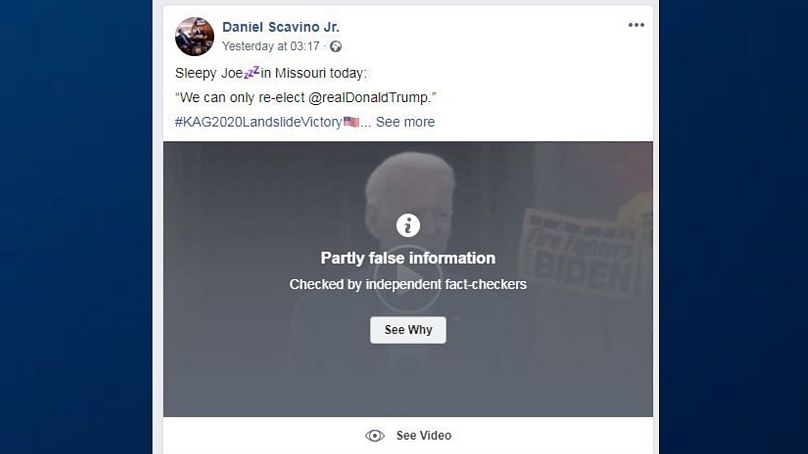The viral clip appears to show the Democrat frontrunner endorsing Donald Trump as US President but had been shortened to remove the end of his sentence.
Facebook and Twitter have labelled a viral video of Joe Biden, uploaded by a White House employee, as "manipulated media".
The video appears to show the Democratic Party frontrunner endorsing his Republican rival Donald Trump during a campaign appearance on Saturday.
In the clip, Biden seemed to tell the crowd in Kansas City that "we can only re-elect Donald Trump."
But the video had been shortened to remove the end of the Democrat's sentence.
The full quote reads: "we can only re-elect Donald Trump if in fact we get engaged in this circular firing squad here. It's got to be a positive campaign."
Twitter says they have added a label to the video, warning users, based on their policy on "synthetic and manipulated media".
Facebook had also marked the video as containing "partly false information".
The edited clip was uploaded by Dan Scavino, White House director of social media and assistant to President Trump, with the caption "sleepy Joe".
Scavino erroneously added that the video is from St. Louis, instead of Kansas City.
The video has been watched more than 6 million times on Twitter in just 36 hours and was shared by both President Trump and his campaign manager, Brad Parscale.
While the video was clearly labelled on Facebook, Twitter confirmed to Euronews that they were working on a fix to ensure the content had been appropriately flagged to its users.
"A clearly deceptive edit"
Twitter says that they will take action against media which is "significantly and deceptively altered or manipulated".
The new policy was announced in October and introduced last week.
It followed calls that social media companies should take more action to prevent the spread of false information ahead of the US Presidential elections in November 2020.
"Subtler forms of manipulated media, such as (...) the omission of context, or presentation with false context, may be labelled or removed [from Twitter] on a case-by-case basis."
Twitter says the labels are used to "help people understand their authenticity and to provide additional context."
Any user who shares the edited video of Joe Biden would also be warned about the content.
The company will only remove content from its platform that is “likely to impact public safety or cause serious harm".
Sam Gregory, Program Director at Witness, told Euronews that it was good to see Twitter marking a "clearly deceptive edit".
But he said that social media platforms "need to do more" than simply label videos as manipulated.
"For example, they need to show the full video alongside for comparison," he added.
"We are reducing its distribution and showing warning labels"
On Facebook, the edited video of Joe Biden was labelled as containing "partly false information" after it had been reviewed by independent fact-checkers.
"We are reducing its distribution and showing warning labels with more context for people who see it, try to share it, or already have," said a Facebook spokesperson.
In a statement to Euronews, Facebook also confirmed that they are reducing the video's distribution.
The company added that the same action would be taken if the video had been shared by a politician.
Facebook faced heavy criticism in May 2019 for refusing to remove an edited video of the US House of Representatives Speaker, Nancy Pelosi.
The video had been slowed down to make it appear as though Ms Pelosi was slurring her speech and stumbling over her words.
In a January blog post, Facebook responded by announcing that they would be removing digitally misleading media, more commonly known as "deep fakes".
But videos would only be taken down if they had been edited using artificial intelligence to depict people saying fictional things.
The ban does not extend to videos that are edited solely to omit or change the order of words.
"If we simply removed all manipulated videos flagged by fact-checkers as false, the videos would still be available elsewhere on the internet or social media ecosystem," said Monika Bickert, Facebook's Vice President of Global Policy Management.
"By leaving them up and labelling them as false, we’re providing people with important information and context."
Was this the right action by social media platforms?
The action taken by Twitter and Facebook has received criticism from across the political spectrum.
Dan Scavino defended the uploaded video, claiming that it was "not manipulated."
Others added that social media platforms were setting a "dangerous precedent" by intervening and labelling the video.
"Defining what is deceptive speech is complicated," Sam Gregory told Euronews.
"In many places, Twitter has neither local team members nor good contextual understands, and all platforms face pressures from governments."
"The Republican push-back that this is about 'playing the referee' also true and worrying in the global context of where Twitter will be pushed to do this on legitimate speech."
The social media giants have also faced a backlash from Democrats over the delay in responding to the edited video of Joe Biden.
Biden's campaign manager, Greg Schultz, criticised Facebook's "unwillingness" to stop the spread of misinformation.
"Facebook's malfeasance when it comes to trafficking in blatantly false information is a national crisis," he tweeted.
"Their unethical behaviour is not acceptable, and it must change".
Watch Matthew Holroyd's report in the player above.












